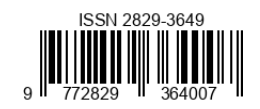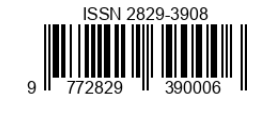Resolving Transnational Crime in the Indonesian Sea Border Area: Case Studies and Legal Effects
DOI:
https://doi.org/10.56910/literacy.v3i2.1665Keywords:
Indonesia's Maritime Borders, International Cooperation, Law Enforcement, Resource Limitations, Transnational CrimeAbstract
The Indonesian maritime border area is susceptible to a range of transnational criminal activities, such as drug trafficking, human trafficking, and forced displacements. These criminal activities pose a significant danger to both the stability of national security and the territorial integrity and sovereignty of Indonesia. The law enforcement challenges in the Indonesian maritime border area are intricate, encompassing inter-agency coordination, international cooperation, and limitations in resources and technology. The primary objective of this study is to address the following crucial inquiry: What are the obstacles encountered in law enforcement against transnational crime at the maritime border of Indonesia? The study employs a normative legal research methodology, which entails analyzing legislative regulations, legal documents, and relevant literature that pertain to law enforcement along the maritime borders of Indonesia. This technique in normative jurisprudence will analyze applicable legal laws, government policies, and pertinent international agreements. The obtained secondary data from legitimate sources will undergo qualitative analysis to identify significant obstacles and possible remedies in law enforcement against transnational crime in the maritime border region of Indonesia.
The study revealed that key hurdles in the enforcement of legislation against transnational crime in Indonesia's maritime border regions encompass inadequate inter-agency coordination, restricted resources and technology, and impediments to international collaboration. To tackle these challenges, it is advised that the Indonesian Government bolster regional and international collaboration, reinforce the capabilities of law enforcement agencies through training and the provision of cutting-edge technology, and establish a comprehensive and integrated policy framework. In addition, enhancing the formulation of comprehensive operational cooperation protocols and implementing efficient dispute resolution processes could enhance the efficacy of law enforcement in the maritime border region of Indonesia.
References
Article 1 of the Law of the Republic of Indonesia No. 32 of 2004 on Maritime Affairs
Bueger C. (2015). What Is Maritime Security. Marine Policy, (53), hlm. 159-164
Dirhamsyah. (2005). Penegakan dan Kepatuhan Hukum Maritim di Indonesia: Masalah dan Rekomendasi. Jurnal Maritim Studi, 144, 1–16.
Hartono, R., & Bakharuddin, B. (2023). Keamanan Maritim Untuk Memerangi Peredaran Gelap Narkotika Lintas Negara Melalui Jalur Laut di Indonesia. Jurnal Impresi Indonesia, 2(8), 809-820.
Lumban Tobing, F. B. (2002). Aktivitas drug trafficking sebagai isu keamanan yang mengancam stabilitas negara. Global: Jurnal Politik Internasional, 5(1), 75-86
Munaf, S. U. (2015). Komando dan Pengendalian Keamanan dan Keselamatan Laut: Berbasis Sistem Peringatan Dini.Jakarta: PT Gramedia Pustaka.
Naseh, M., Ikhwanuddin, I., Ramadhani, F., Kusprabandaru, A., & Bathara, B. (2019). Karakteristik Pelaku Kejahatan Transnasional Terorganisasi Di Indonesia Dan Eropa. Jurnal Hubungan Internasional, 8(1), 48-60
Prayuda, R., & Harto, S. (2020). ASEAN dan Kejahatan Transnasional Narkotika (Dinamika, Tantangan dan Hambatan).
Yuwono, T., Kusniati, R., & Ardianto, B. (2021). Bantuan Hukum Timbal Balik Dalam Penanganan Kejahatan Transnasional: Studi Kasus Indonesia-Swiss. Uti Possidetis: Journal of International Law, 2(3), 268-287
Yuwono, T., Kusniati, R., & Ardianto, B. (2021). Bantuan Hukum Timbal Balik Dalam Penanganan Kejahatan Transnasional: Studi Kasus Indonesia-Swiss. Uti Possidetis: Journal of International Law, 2(3), 268-287.
Downloads
Published
How to Cite
Issue
Section
License
Copyright (c) 2024 LITERACY : International Scientific Journals of Social, Education, Humanities

This work is licensed under a Creative Commons Attribution-ShareAlike 4.0 International License.







